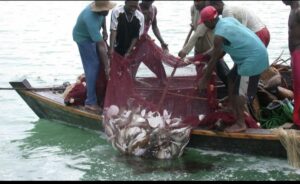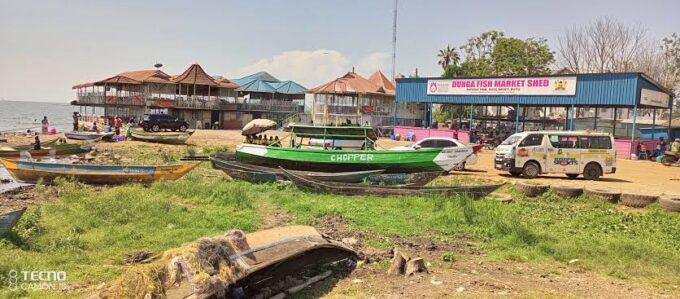Lake Victoria, the largest freshwater lake in Africa, is facing an environmental crisis as illegal fishing practices threaten its fragile ecosystem and the livelihoods of thousands of fishermen. In response to alarming declines in fish stocks, authorities are considering a six-month fishing ban aimed at allowing the lake’s aquatic life to recover.
This decision comes amid growing concerns over the impact of overfishing and the use of illegal fishing gear, which have significantly depleted fish populations.

Fishermen while fishing in lake Victoria//Photo Courtesy
Recent investigations by the Kenya Fisheries Service (KFS) have revealed a troubling trend: a network of rogue Beach Management Unit (BMU) officials has been implicated in permitting illegal fishing activities. These officials have been allowing the use of banned fishing gear, contributing to the decline in fish stocks that local communities rely on for their livelihoods.
According to George Omondi, Assistant Director at the State Department of Blue Economy, “Law enforcement in the lake has been weak and has led to reduced fish stocks. We must act now to save our fisheries.”
The situation is dire. Reports indicate that fish catches in Lake Victoria have plummeted from an annual average of 5,000 tonnes to just 2,500 tonnes in recent years. This dramatic decline has raised alarms among environmentalists and local communities alike, as many families depend on fishing for their income and food security.
In light of these developments, KFS is advocating for a temporary fishing ban to allow fish populations to recover. The proposed six-month ban would prohibit all fishing activities on the lake, giving fish stocks a much-needed respite from overexploitation. The ban is expected to be implemented following consultations with stakeholders, including local fishermen, environmental groups, and government officials.
“The health of Lake Victoria is critical not only for biodiversity but also for the economic stability of communities around it,” said KFS Director Dr. James Ayienda during a recent press briefing.
“We believe that a temporary ban will provide an opportunity for fish populations to rebound and ensure sustainable fishing practices in the future,” he added.
The response from local fishermen has been mixed. While many acknowledge the need for sustainable practices and express support for measures that could restore fish stocks, there are concerns about the immediate economic impact of a ban.
Fishermen like 45-year-old Peter Ochieng from Homa Bay County expressed their fears.
He said, “If we stop fishing for six months, how will we feed our families? We want to protect our lake, but we also need to survive.”
Community leaders are urging authorities to implement support mechanisms for fishermen during the ban period.
“It is crucial that the government provides alternative livelihoods or financial assistance to those who will be affected by this ban,” said Homa Bay County Fisheries Director George Okoth.
“Let all fishermen follow the law and save the lake from its deathbed,” he added.
The ecological health of Lake Victoria is not just a local concern; it has broader implications for regional biodiversity and food security. The lake is home to numerous species of fish, many of which are endemic and play vital roles in their ecosystems. Overfishing not only threatens these species but also disrupts food chains and affects other wildlife that depend on healthy aquatic environments.
Environmentalists are advocating for more comprehensive management strategies beyond a temporary ban.
“We need long-term solutions that include better enforcement of existing regulations, community education on sustainable practices, and investment in alternative livelihoods,” said Dr. Jane Muthoni, an environmental scientist focused on Lake Victoria’s ecology.
As discussions continue regarding the proposed fishing ban on Lake Victoria, it is clear that urgent action is needed to address the challenges facing this vital resource. The balance between economic necessity and environmental sustainability hangs in the balance as stakeholders navigate this complex issue.
The impending ban represents both a challenge and an opportunity: a chance to restore one of Africa’s most important freshwater ecosystems while ensuring that local communities can thrive sustainably in harmony with their environment. As authorities work towards implementing this critical measure, the hope remains that collective efforts will lead to a healthier Lake Victoria for generations to come.











